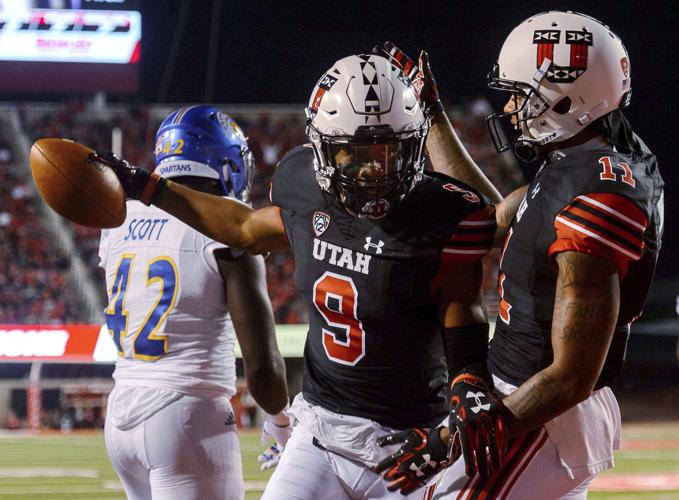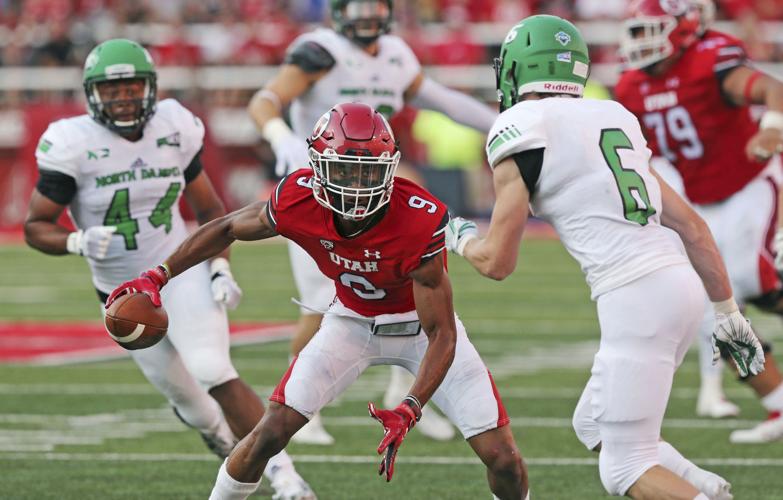Darren Carrington is the son of a former Super Bowl safety, an NAU Lumberjack who is now a parenting counselor for the Rock Church in San Diego. Darren’s sister, DiJonai, was a McDonald’s All-American basketball player who now suits up for Stanford.
It’s tough to beat the Carrington family sports tree.
Arizona fans may remember Carrington from the 2014 Pac-12 championship game; in Oregon’s 51-13 victory over the Wildcats, he caught seven passes for 126 yards and a touchdown. A few weeks later in a Rose Bowl victory over Florida State in the national semifinals, Carrington was even better: seven catches, 165 yards and two touchdowns.
Friday at Arizona Stadium, Carrington will be wearing Utah jersey No. 9. If he’s not the most-feared receiver in the Pac-12, who is? A better question might be: Why is he playing for Utah?
Arizona offered Carrington a scholarship when he was a senior at Horizon Christian High School in San Diego, but that was five years ago and the Wildcats were lost in a blur of big-boy schools like Michigan, Ohio State and Oregon.
Last summer, after Carrington was dismissed from Oregon’s program, Arizona again pursued Carrington. Who didn’t? It was the college football equivalent of Odell Beckham Jr. becoming a free agent.
This time the Utes prevailed.
In his three years at Oregon, Carrington was arrested for DUI — he smashed his car into a pole at a McDonald’s drive-thru at 2:30 a.m. two months ago — and was suspended from the 2015 national championship game (and for the first six games of 2015) for failing an NCAA drug test. After the Ducks’ homecoming game last fall, Carrington was accused of pushing a Duck fan to the ground and breaking his arm. No charges were filed.
In July, the Ducks asked Carrington to leave the premises. His phoned buzzed and buzzed. Virtually every team in the Pac-12 wanted to give him a second (or third) chance.
He would be eligible immediately.
No matter how unseemly it looks, Utah “won” the Carrington chase. In three games, Carrington has become the league’s go-to receiver, catching 26 passes for 409 yards and four touchdowns. He’s big – 6 feet, 2 inches, 205 pounds — and fast. He is what Arizona and many Pac-12 teams don’t have.
The Utes said all the right things when they acquired the troubled receiver.
“Does he understand that he’s done some stupid things and is he ready to put it behind him and move on?” Utah coach Kyle Whittingham asked last month. “It’s a judgment call. You’re not always right. But I feel in this case it was the right thing to do to give Darren another opportunity.”
Sometimes these second-chance opportunities work. Sometimes your school’s athletic director and president look the other way in hopes of winning the Big Game.
Carrington will be a Ute for about five months. He’ll use them for an NFL audition; the Utes are using him in attempt to get to the Rose Bowl. Over the years, every school in the league has done as much; Arizona starts a defensive lineman from Boise State who was arrested in 2016 for felony mayhem following a fight in which he was accused of biting off a piece of a teammate’s ear.
Boise State dismissed the lineman from school; last spring a Boise jury found the player not guilty.
Sometimes you must wait 20 or 30 years to determine if the second chance worked. There are few better examples than what Arizona’s Dick Tomey did in 1989.
Tomey helped Alabama defensive end Anthony Smith enroll at Pima College and regain his academic eligibility. Smith, who had been a Parade All-American and standout player at Alabama, played his final season at Arizona. He became a first-team All-Pac-10 player and the 11th overall choice in the 1990 NFL draft.
In October 1989, Smith told the Star about his troubled upbringing in Brooklyn, N.Y., which included a two-year period in which he abused drugs and alcohol and lived on the streets.
“I can’t even think where I’d be, probably on death row somewhere if I didn’t have football in my life,” said Smith.
Tomey more or less rescued Smith and became a father figure. Smith said his mother and father both died of drug-related issues before he was 8. He talked about Tomey coming to his house at 5 a.m. — “rubbing the sleep from his eyes” — just to talk about life and to encourage Smith to do the right things.
After seven years with the Oakland Raiders, Smith retired. He has spent most of the last 15 years in jail. Two years ago he was sentenced to life in prison, without parole, convicted of murdering three Southern California men from 1999 to 2001.
There was another Smith on the UA’s 1989 roster who made good on his second chance.
As Anthony Smith became a difference-maker on Arizona’s defensive line, the Wildcats stunned No. 6 Oklahoma and No. 11 Washington in back-to-back September weekends at Arizona Stadium.
During a last-minute 20-17 victory over the Huskies, Arizona’s version of Darren Carrington was Melvin Smith, a fifth-year receiver from Carson, Calif.
Smith caught a 43-yard touchdown pass to give Arizona a 14-10 lead, and then caught a pass to set up the deciding field goal.
Early the next morning, Tomey got the type of phone call that Oregon coach Willie Taggart surely got when Carrington was arrested at 2:30 a.m., on July 2 in Eugene.
Tomey was told that Melvin Smith had discharged a weapon into a crowd of people at the old Skate Country North building on Stone Avenue. No one was injured, but two policemen witnessed the shooting.
Smith was suspended from school; a judge placed him on three years probation. He never played another down of college football.
But Tomey insisted Smith was a young man of good character and stood by him. He wrote a letter to NFL general managers recommending that not only was Smith good enough to play in the NFL, but also a person who could be trusted to do the right thing.
The NFL invited Smith to the annual scouting combine in Indianapolis, and although he wasn’t drafted, he signed with the CFL’s Calgary Stampeders. Better yet, Melvin Smith stayed in school, earned a degree in May of 1990 and has gone on to a productive life as a youth counselor, coach and mentor, mostly in the Phoenix area.
One of Arizona’s risks worked. Another became a tragedy.
In college football, if you bat .500 in the second-chance business you are beating the odds. Let’s hope the Utes aren’t swinging at a wild pitch.





